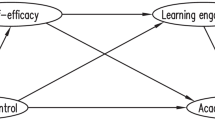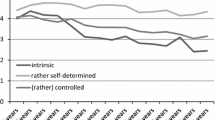Abstract
Duckworth and Seligman’s seminal work found that self-discipline (self-control) was more salient for academic achievement than intelligence. Very little replication work exists, including in different cultures; the current study addressed these gaps. Data were collected from 6th and 7th grade cohorts of early adolescents (N = 589; age: Mean = 12.34 years, and SD = 0.89; 58% female) over two years. The study tested whether self-control was a stronger predictor than intelligence in explaining academic performance two years later as well as in explaining developmental changes over the course of two years. Path analyses provided evidence that both self-control and intelligence longitudinally predicted teacher-reported academic competence as well as school-reported grades; however, intelligence was a significantly stronger predictor than self-control. In addition, only intelligence predicted developmental changes in each measure of academic performance over time, self-control did not.



Similar content being viewed by others
References
Barton, K., Dielman, T. E., & Cattell, R. B. (1972). Personality and IQ measures as predictors of school achievement. Journal of Educational Psychology, 63(4), 398–404. https://doi.org/10.1037/h0033573.
Bond, L., Butler, H., Thomas, L., Carlin, J., Glover, S., Bowes, G., & Patton, G. (2007). Social and school connectedness in early secondary school as predictors of late teenage substance use, mental health, and academic outcomes. Journal of Adolescent Health, 40(4), 357–e9. https://doi.org/10.1016/j.jadohealth.2006.10.013.
Cerasoli, C. P., Nicklin, J. M., & Ford, M. T. (2014). Intrinsic motivation and extrinsic incentives jointly predict performance: A 40-year meta-analysis. Psychological Bulletin, 140(4), 980–1008. https://doi.org/10.1037/a0035661.
Daly, M., Delaney, L., Egan, M., & Baumeister, R. F. (2015). Childhood self-control and unemployment throughout the life span: Evidence from two British cohort studies. Psychological Science, 26(6), 709–723. https://doi.org/10.1177/0956797615569001.
Duckworth, A. L., & Seligman, M. P. (2005). Self-discipline outdoes IQ in predicting academic performance of adolescents. Psychological Science, 16(12), 939–944. https://doi.org/10.1111/j.1467-9280.2005.01641.x.
Duckworth, A. L., Quinn, P. D., & Tsukayama, E. (2012). What No Child Left Behind leaves behind: The roles of IQ and self-control in predicting standardized achievement test scores and report card grades. Journal of Educational Psychology, 104(2), 439–451. https://doi.org/10.1037/a0026280.
Evans, T. D., Cullen, F. T., Burton, V. S., Dunaway, R. G., & Benson, M. L. (1997). The social consequences of self‐control: Testing the general theory of crime. Criminology, 35, 475–504. https://doi.org/10.1111/j.1745-9125.1997.tb01226.x.
Fan, H., Xu, J., Cai, Z., He, J., & Fan, X. (2017). Homework and students’ achievement in math and science: A 30-year meta-analysis, 1986–2015. Educational Research Review, 20, 35–54. https://doi.org/10.1016/j.edurev.2016.11.003.
Fischer, F., Schult, J., & Hell, B. (2013). Sex differences in secondary school success: why female students perform better. European Journal of Psychology of Education, 28(2), 529–543. https://doi.org/10.1007/s10212-012-0127-4.
Gagné, F., & St Père, F. (2002). When IQ is controlled, does motivation still predict achievement? Intelligence, 30(1), 71–100. https://doi.org/10.1016/S0160-2896(01)00068-X.
Gottfredson, L. S. (1997). Why g matters: the complexity of everyday life. Intelligence, 24, 79–132. https://doi.org/10.1016/S0160-2896(97)90014-3.
Gresham, F. & Elliott, S. N. (2008). Social skills improvement system (SSIS) rating scales. San Antonio, TX: Pearson.
Hofer, M., Kuhnle, C., Kilian, B., & Fries, S. (2012). Cognitive ability and personality variables as predictors of school grades and test scores in adolescents. Learning and Instruction, 22(5), 368–375. https://doi.org/10.1016/j.learninstruc.2012.02.003.
Kim, K. R., & Seo, E. H. (2015). The relationship between procrastination and academic performance: A meta-analysis. Personality and Individual Differences, 82, 26–33. https://doi.org/10.1016/j.paid.2015.02.038.
Laidra, K., Pullmann, H., & Allik, J. (2007). Personality and intelligence as predictors of academic achievement: A cross-sectional study from elementary to secondary school. Personality and Individual Differences, 42(3), 441–451. https://doi.org/10.1016/j.paid.2006.08.001.
Li, J. B., Delvecchio, E., Lis, A., Nie, Y. G., & Di Riso, D. (2015). Parental attachment, self-control, and depressive symptoms in Chinese and Italian adolescents: Test of a mediation model. Journal of Adolescence, 43, 159–170. https://doi.org/10.1016/j.adolescence.2015.06.006.
Lynn, R., Meisenberg, G., Mikk, J., & Williams, A. (2007). National IQs predict differences in scholastic achievement in 67 countries. Journal of Biosocial Science, 39(6), 861–874. https://doi.org/10.1017/S0021932007001964.
Meijer, A. M., & van den Wittenboer, G. L. (2004). The joint contribution of sleep, intelligence and motivation to school performance. Personality and Individual Differences, 37(1), 95–106. https://doi.org/10.1016/j.paid.2003.08.002.
Morosanova, V. I., Fomina, T.G., & Bondarenko, I. N. (2015). Academic achievement: Intelligence, regulatory, and cognitive predictors. Psychology in Russia: State of the Art, 8(3), 136–156. https://doi.org/10.11621/pir.2015.0311.
Murayama, K., Pekrun, R., Lichtenfeld, S., & Vom Hofe, R. (2013). Predicting long‐term growth in students’ mathematics achievement: The unique contributions of motivation and cognitive strategies. Child Development, 84(4), 1475–1490. https://doi.org/10.1111/cdev.12036.
Muthén, L. K., & Muthén, B. O. (2017). Mplus: Statistical analysis with latent variables: User’s guide (Version 8). Los Angeles, CA: Authors.
Niehaus, K., Rudasill, K. M., & Rakes, C. R. (2012). A longitudinal study of school connectedness and academic outcomes across sixth grade. Journal of School Psychology, 50(4), 443–460. https://doi.org/10.1016/j.jsp.2012.03.002.
Nitzl, C. (2010). Eine anwenderorientierte einführung in die partial least square (PLS)-methode. Inst. für Industrielles Management.
Piquero, A. R., Jennings, W. G., Farrington, D. P., Diamond, B., & Gonzalez, J. M. R. (2016). A meta-analysis update on the effectiveness of early self-control improvement programs to improve self-control and reduce delinquency. Journal of Experimental Criminology, 12(2), 249–264. https://doi.org/10.1007/s11292-016-9257-z.
Plomin, R., & von Stumm, S. (2018). The new genetics of intelligence. Nature Reviews Genetics, 19(3), 148–159. https://doi.org/10.1038/nrg.2017.104.
Poropat, A. E. (2009). A meta-analysis of the five-factor model of personality and academic performance. Psychological Bulletin, 135(2), 322–338. https://doi.org/10.1037/a0014996.
Raven, J., Raven, J.C., & Court, J.H. (2003). Manual for Raven’s Progressive Matrices and Vocabulary Scales. San Antonio, TX: Harcourt Assessment.
Richardson, M., Abraham, C., & Bond, R. (2012). Psychological correlates of university students’ academic performance: A systematic review and meta-analysis. Psychological Bulletin, 138(2), 353–387. https://doi.org/10.1037/a0026838.
De Ridder, D. T., & Lensvelt-Mulders, G. (2018). Taking stock of self-control: A meta-analysis of how trait self-control relates to a wide range of behaviors. In Self-Regulation and Self-Control (pp. 221–274). Routledge.
Roth, B., Becker, N., Romeyke, S., Schäfer, S., Domnick, F., & Spinath, F. M. (2015). Intelligence and school grades: A meta-analysis. Intelligence, 53, 118–137. https://doi.org/10.1016/j.intell.2015.09.002.
Von Suchodoletz, A., Larsen, R. A., Gunzenhauser, C., & Fäsche, A. (2015). Reading and spelling skills in German third graders: Examining the role of student and context characteristics. British Journal of Educational Psychology, 85(4), 533–550.
Tangney, J. P., Baumeister, R. F., & Boone, A. L. (2004). High self‐control predicts good adjustment, less pathology, better grades, and interpersonal success. Journal of Personality, 72, 271–324. https://doi.org/10.1111/j.0022-3506.2004.00263.x.
Valiente, C., Lemery-Chalfant, K., & Castro, K. S. (2007). Children’s effortful control and academic competence mediation through school liking. Merrill-Palmer Quarterly, 53(1), 1–25.
Vazsonyi, A. T., Mikuška, J., & Kelley, E. L. (2017). It’s time: A meta-analysis on the self-control-deviance link. Journal of Criminal Justice, 48, 48–63. https://doi.org/10.1016/j.jcrimjus.2016.10.001.
Weis, M., Trommsdorff, G., & Muñoz, L. (2016). Children’s self-regulation and school achievement in cultural contexts: the role of maternal restrictive control. Frontiers in Psychology, 7, 722 https://doi.org/10.3389/fpsyg.2016.00722.
Weissberg, R. P., Voyce, C. K., Kasprow, W. J., Arthur, M. W., & Shriver, T. P. (1991). The social and health assessment. Chicago, IL: Authors.
Acknowledgements
We would like to sincerely thank the school administrators, students, and teachers for their participation.
Author information
Authors and Affiliations
Contributions
A.V. conceived of the study, designed it, participated in its measurement and statistical analyses, and drafted the manuscript; M.J. carried out the statistical analyses and interpretation, and drafted the manuscript; M.B. participated in the design and measurement of the study, and coordinated data collection. All authors read and approved the final manuscript.
Funding
The study was funded by the John I. and Patricia J. Buster Endowment of Family Sciences, awarded to the first author; some additional support was provided by the Institute of Psychology, Academy of Sciences of the Czech Republic. No funding was received to assist with the preparation of this manuscript.
Data Sharing Declaration
The datasets generated and/or analyzed during the current study are not publicly available but are available from the corresponding author on reasonable request.
Corresponding author
Ethics declarations
Conflict of Interest
The authors declare that they have no conflict of interest.
Compliance with Ethical Standards
The study was performed in accordance with the ethical standards as laid down in the 1964 Declaration of Helsinki and its later amendments.
Ethical Approval
The study was approved by the University of Kentucky Institutional Review Board and the Institutional Board of the Institute of Psychology, Academy of Sciences of the Czech Republic.
Informed Consent
Written informed consent was obtained from the parents of study participants; participants also provided assent to participate in the study.
Additional information
Publisher’s note Springer Nature remains neutral with regard to jurisdictional claims in published maps and institutional affiliations.
Rights and permissions
About this article
Cite this article
Vazsonyi, A.T., Javakhishvili, M. & Blatny, M. Does Self-control Outdo IQ in Predicting Academic Performance?. J Youth Adolescence 51, 499–508 (2022). https://doi.org/10.1007/s10964-021-01539-4
Received:
Accepted:
Published:
Issue Date:
DOI: https://doi.org/10.1007/s10964-021-01539-4




